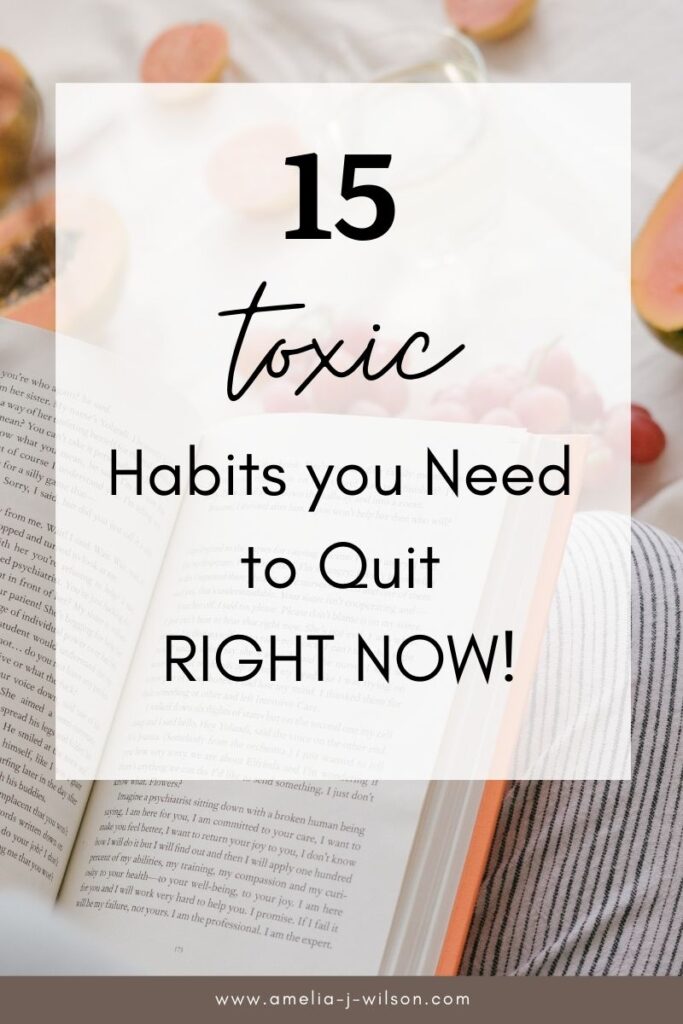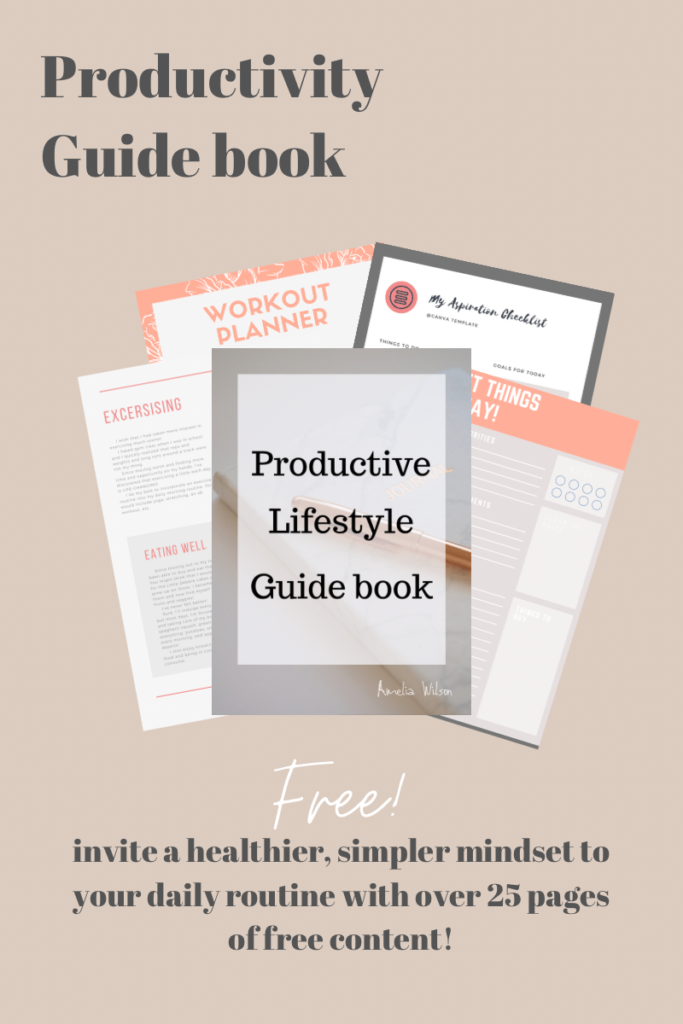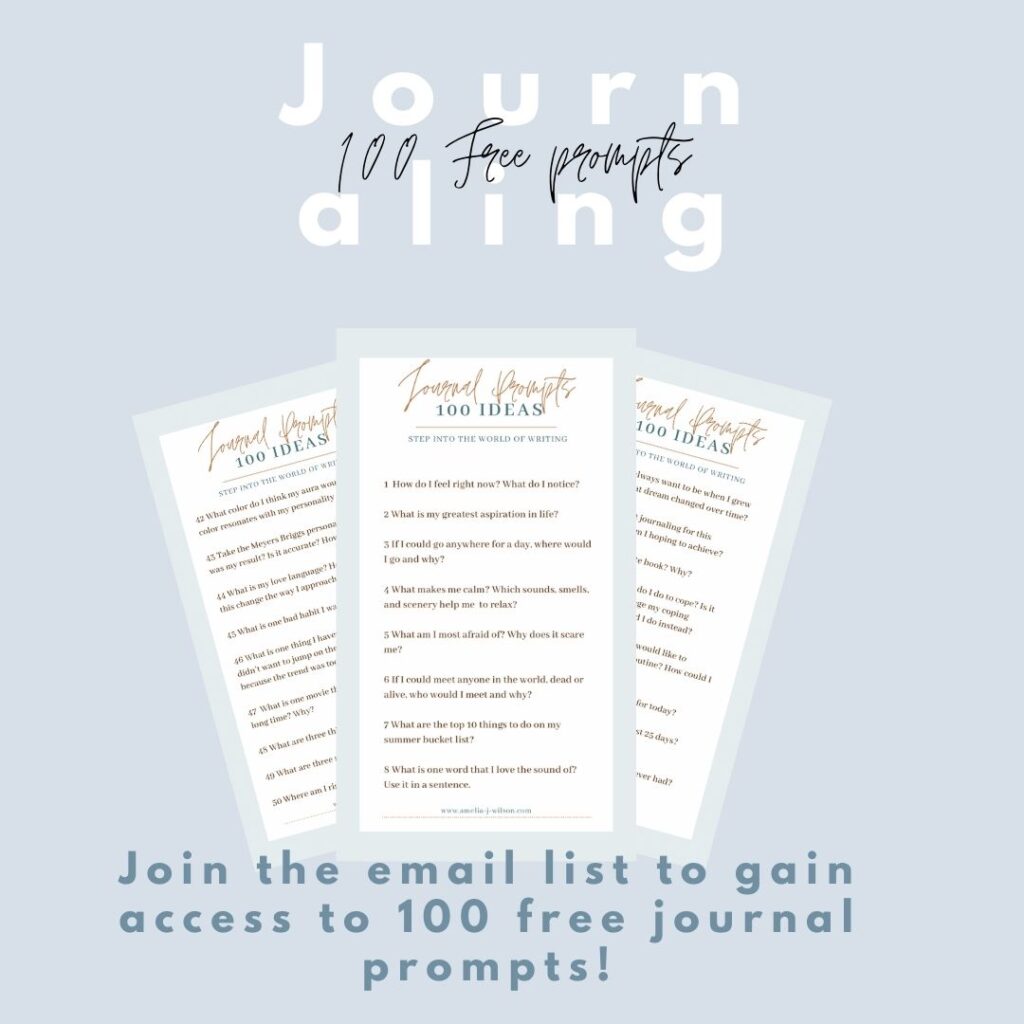We’ve all got a few toxic habits that we just can’t seem to shake. One of mine is that I stay up far too late and regret it in the morning!
But whether or not you push yourself to extremes or kick back and relax too often, there comes a time when each of us needs to stop and re-evaluate our lives. Ridding yourself of toxic habits is sort of like shedding old skin and making room for new growth.
So, if you’re unsure which toxic habits require eradicating, start here. This post will offer fifteen things you can work to eliminate to live a more fulfilling life.
Disclaimer: All of the views and opinions in this post are solely my own and are not sponsored. This post may include affiliate links, meaning I earn a commission through links at no cost to you.

1. Not getting a full night’s sleep
Notice, I didn’t say you should wake up early! I’m a firm believer that each of us operates at our best when we follow our natural circadian rhythm. If you’re not a morning bird, why push yourself to wake up early if you don’t have to?
Personal development gurus will tell you how miraculous it is to wake up early each and every day. However, I think that it’s more important to make sure you’re getting a full night’s sleep instead. Even if you fall asleep at one in the afternoon and wake up at ten at night, it’s better to get quality sleep than to push your body to do something it just isn’t capable of doing.
There are a few things that you can do to ensure you get proper sleep. If you want to learn more, check out my blog post on hacks for a better night’s sleep.
Or, at minimum, follow these tips:
- Go to bed and wake up at the same time each day
- Avoid technology right before bed
- Have a glass of water nearby for the morning
- Always set aside enough time for sleep (8-9 hours for most people and 12-14 hours for teens)
- Don’t force yourself to sleep or wake at a specific time if you don’t have to
Proper sleep is beyond valuable for your physical and mental health, so if you have toxic sleep habits, now is the time to start adjusting them!
2. Spending too much time on social media
Social media is both a blessing and a curse. I’m sure you’ve heard of the people attempting a social media detox or deleting apps to gain better clarity and self-worth in life.
While social media is an excellent resource for news and a line of communication with those you don’t usually get to see, it’s also its own weapon of destruction.
I used to spend quite a bit of time on social media, where I based my worth on my likes and shares. And heck, in my industry (with a blog anyway!), it can be downright impossible NOT to judge your success based on social media metrics.
But the more significant issue isn’t that we judge ourselves against likes and follows alone. In fact, the entire system is a self-comparison game. Every photo we see, we compare ourselves to. The worst part is that we only see the tip of the iceberg and any elaborate story we create for ourselves is just that…a thing of our own creation. We place our self-worth, failures and successes, confidence, and status based on our perceptions of social media.
To combat this toxic behavior, there are a few things you can do. First, you can limit the time spent on certain apps. For IOS, you can go to your settings and set a time for downtime (when your non-essential apps shut off so that you don’t use them) or set app limits (ex: I have a 30 minute Instagram app limit each day).
Social media detoxes and deleting apps can also help in more serious cases. Often, we mindlessly open apps with no real intention behind why we do so. While I’ve never gone this far, I do want to take a month off social media at some point to see what happens.
3. Not planning your day
One of the things that often set people up for failure is not planning properly for their day.
Planning your day can help you hone your focus and can transform the way you approach tasks. Your productivity is rooted in your preparedness and ability to organize your life in a way that allows you to essentially “work smarter, not harder.” Therefore, the simple habit of planning your day can revolutionize the way you approach your life.
Right after breakfast, I whip out my bullet journal and create a task list for my workday. On days off, I typically store notes about chores in my phone or not at all. However, on heavy workdays, it helps to have a handwritten list of “to-do’s” at my side to stay on track.
Try using a notebook for planning your day every day for a week and see how it changes your life!
4. Not drinking enough water
One of the toxic habits you might not have considered is that you aren’t drinking enough water. It seems silly to put this habit on the list, but the truth is, most of us aren’t drinking enough water. This can be a difficult habit to break, but I have a few tips and tricks you can steal to make this step much easier to achieve.
First, keep a water bottle near you at all times. Whenever you find yourself needing to quench your thirst, the water bottle will be the closest drink available to you, and you’ll be more likely to use it. The reasoning for this is simply that humans are relatively lazy, and we tend to opt for the nearest solution. I learned this tidbit after reading Atomic Habits by James Clear. Essentially, when it comes to forming a new habit, keeping your target in plain view and making it easily accessible will encourage you to opt for it over something less beneficial.
My second tip is to set a reminder every hour or so to drink water. I don’t necessarily do this, but I do have an alarm on my phone to remind myself to take a fifteen-minute break every two hours. During that break, I drink water with the goal of finishing at least half of my bottle.
My last tip for drinking more water is to use a tracker of some sort. When it comes to tracking food, I personally love Lifesum. It’s a beautiful food tracking and dietary app that allows me to track the amount of water I drink. So, I highly recommend you do something similar or at least find a tracker that works for you!

5. Comparing yourself to others
I mentioned this above in the social media section, but I think this particular toxic habit goes beyond the digital world. Sure, it’s easier to compare ourselves when people share their highlights online, but we continue to compare ourselves to others, even in everyday life.
This is a difficult habit to break, and ultimately, you need to find a way to step back and recognize that the only comparison you should be making is that with yourself. I struggle with this habit A TON! I find myself comparing my traits and appearance with friends, my sister, my significant other, and even strangers on the street.
However, I’ve learned that the only journey and traits I should look to are my own. I need to ask myself, “Am I growing? Am I improving? And how have I changed?”
If you find yourself comparing your life to another person’s, take a minute to reflect on who you were six months to a year ago and ask yourself the above questions. It’s far more productive and motivating than the alternative, toxic habit of comparing yourself to others.
6. Spending too much time on “what if’s”
Many of us can get caught up in the “what if’s” in life. This can go several ways with situations like:
- What if I was richer?
- What if I achieved my dream?
- What if that missed opportunity would have helped me?
- What if I’m missing out on things?
- What if X situation happens and I end up struggling?
The list goes on, but unfortunately, many of us get caught up in the “what if’s” of our futures and pasts.
I struggle with the past scenarios where I wonder what would have happened if I led a different life or made different decisions. The issue with this mentality is that it inevitably holds you back. You become stunted because you focus on things you can’t change. And THAT is a waste of your time.
Rather than focusing on what you can’t change, focus on what you can. I think there are a few ways you can implement a better mindset here.
First, you can make a Venn diagram of things you can control, things you can’t, and things that are in the middle. I’ll share a simple one below:
Sure, some of these things are up for interpretation and depend on each individual’s circumstance, but for me, this is what I can and can’t control. I live on my own and have my own income, so I can dictate which groceries I buy, for example. However, I can’t control other people’s reactions or responses.
Making a diagram similar to this one can help significantly by allowing you to see where you have a say in what happens to you. This allows you a sense of separation from the “what if’s” that you can’t control. For example: I crashed my car in October 2019. What if that had never happened? How would my life be? The thing is, I couldn’t control that accident. That’s why it’s an accident. So, there’s no reason to continue stressing out over it!
Additionally, writing gratitude lists can help disintegrate that “what if” mindset. If you’re stuck wondering things like, “what if I fail? What if I were prettier? What if I were better at X thing?” Then you might benefit from writing down what you’re grateful for!
Example:
- I’m grateful for having a job
- I’m grateful for living in a home I can decorate
- I’m grateful that I can go for walks or head to the beach.
Again, this will change depending on the person, but I’ve found that gratitude lists really have changed my life for the better.
7. Not reflecting on your goals
I think a lot of people neglect to reflect on their goals every once in a while. Personally, I like to reflect on my goals often and choose to sit down and write out my goals each quarter. The reason for this is that goals are ever-changing. Sometimes we accomplish things we set out to do, sometimes, we fail, and sometimes we move on to better things.
I once had the goal to graduate college at twenty-four. When that dream fell through, I moved on, and that’s OKAY!
Reflecting on your goals now and again allows you to re-evaluate what’s working and what isn’t. Additionally, it helps you gain focus and create purpose in life. I highly recommend that every so often (once a month, quarterly, or yearly), you reflect on your personal goals to see where you’re at and where you plan to go.
8. Ignoring your passions
Going along with this goal-setting mindset, I think passion plays a big role in overall life happiness. All too often, I talk to people who’ve allowed their passions to fall to the back burner. This typically ends up leaving people feeling lost, confused, or sad.
It can be challenging to rekindle old passions depending on where you are in life, but I’ve found that recognizing those little hobbies that make you happy can make a world of difference.
I love scrapbooking, gardening, and archery, for example. And I try to actively follow these passions for my own enjoyment and happiness. Your passion doesn’t have to become a career, no matter what those gurus tell you. Instead, treat your passions like food. You need them to live, and you should chase after them when you can.
9. Spending too much time working
In 2020, I spent most of my time stressed about work. I got involved in the idea of “hustle culture” and dove deep into the world of productivity. While I still love productivity, and I love my work, I’ve also found that it is far too easy to get out of balance between work and life.
Our society places a lot of pressure on us to “hustle,” “grind,” and work hard as often as possible. I especially see this push for excessive work on people in their twenties and thirties as older adults urge the younger generation to work their butts off now to reap the rewards later. And while yes, there is some value in following that advice, it should never be followed to the extreme.
I urge you to work, sure, but also to make mistakes while you’re young. This is the time to learn and grow, and you can’t do that without a few slip-ups. I also urge you to travel and live life as fully as possible. Others tell you to work hard because you’ve got a lot of energy and good legs, so “use ‘em.” And I say, yeah, you’ve got a lot of energy and good legs, so go out and explore. Don’t just work.
10. Not actively pursuing your goals
Today (as I write this), I listened to the Do You Even Blog podcast, and Pete read a guest post from Jim Wang about things he wished he knew before blogging. In the podcast, there was an idea mentioned that really surprised me.
This idea is that people often feel accomplished when telling others their goals even if they haven’t yet achieved them. This is due to the praise that comes with the support of others as you share your goals. However, since you receive a feeling of accomplishment when sharing your ideas, sometimes it deters you from acting on them.
Actively pursuing your goals can be difficult and even daunting (depending on the goal), but you will never achieve it or grow in life if you don’t take those first few steps. So take the risk, make a plan, and actively pursue your goals as often as you can.
11. Taking small things for granted
In high school, I had a teacher who always said her optimism and positive attitude stemmed from her love of the small things in life. I used to think it was silly, and sometimes I find it hard to enjoy the small things. But if I’ve learned anything, it’s that the small things are what make life truly special.
Here are some examples of small things I really enjoy:
- When a dog licks your hand and wags its tail upon seeing you
- The smell of freshly brewed coffee in the morning
- The beach
- Flowers
- Playing a podcast while I make breakfast
- Sitting outside with a good book
- Riding on the train
I’ve tried to use my gratitude lists as a place to jot down these simple things that make me happy. What I’ve found is that it allows you to step away from that “macro” view of life and to hone in on your senses and what sparks true joy.
12. Not placing value on exercise
I still struggle to get into a full-blown workout routine, and I’m not quite sure why because I love the feeling after I’ve exercised. While this habit requires more self-discipline for some, it’s one of the healthiest things you can do for yourself.
Take time to make an exercise routine or schedule your day to allow for some fitness activities. It can even be yoga or a short walk. Just do something that will enable you to move your body!
13. Not taking time for yourself
While reading Essentialism by Greg McKeown, I learned that Bill Gates takes two weeks off each year to just himself. There’s no traveling, no meetings, nothing but a bit of silence and his own company.
While we don’t all have the luxury of two weeks to ourselves a year, it is possible to take one day a month to ourselves (which is sort of the same thing!). Since implementing this strategy in my life, I’ve felt happier and more refreshed. I typically take one day to do absolutely nothing, and it helps me recharge and reflect on my life.
Taking time for yourself is a vital part of self-care that we often neglect. However, there are several profound benefits of being with just yourself whenever you can.
14. Holding yourself back
Often, we are our own sabotagers and worst critics. Self-sabotage is an illness we all struggle with and often leads to us falling short of our goals. We allow fear, negativity, criticism, and doubt to fill our minds to the point where we hold back and step away from our goals.
While I don’t have an abundance of solutions for convincing yourself that you are worth it, I do have two blog posts on imposter syndrome that could greatly benefit you if you feel you’re holding yourself back due to fear.
Do your best to keep pushing forward rather than stepping in your own way. It’s challenging, but not impossible!
15. Not working on personal growth
The final toxic habit I see many people doing is not working on their personal growth. While there certainly is an extent to how much personal growth you can implement into your life, you can’t go wrong seeking self-improvement.
I do want to point out that many resources in the personal growth space can come across as slightly toxic. My advice to you is to be careful. Gurus and influencers may tell you that your life sucks, and they can promise you happiness but don’t buy into it too quickly. Happiness is ever-changing, and you will always find new goals for yourself. Negativity will cross your path the rest of your life, and the best thing you can do is feel it and then move on.
Below are some of my favorite personal growth books that have taught me to appreciate the present moment without forcing myself to “grow” or seek “complete happiness.” I recommend that you start with these if you’re looking to start a personal growth journey.
Books to read:
While this is just a starting point, feel free to broaden your horizons as you go!

If you like this post, check out some similar posts of mine below!
Feel free to leave a comment below and let me know what habits you need to give up.
You can also email me with questions or concerns you may have at info.amelia.wilson@gmail.com
My new book, Witch in the Water, is available on Amazon!
Also, check out my poetry book, The Lights are on but Nobody’s Home, available now on amazon for $6.99 in paperback form!
Disclaimer: All of the views and opinions in this post are solely my own and are not sponsored. This post includes affiliate links, meaning I earn a commission through links at no cost to you.
Thanks again

